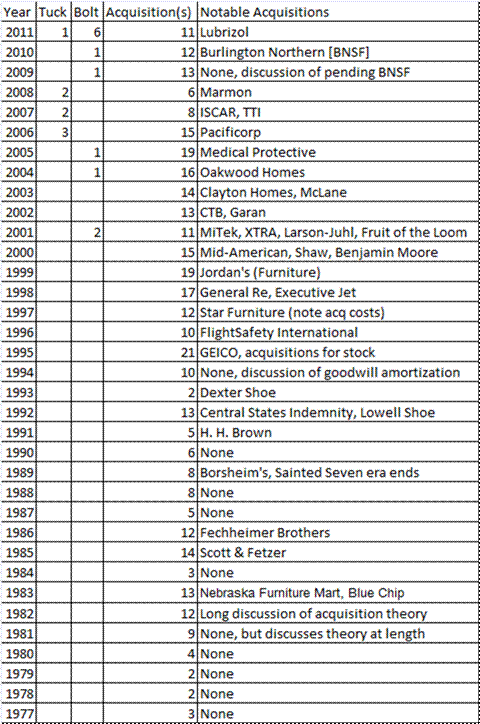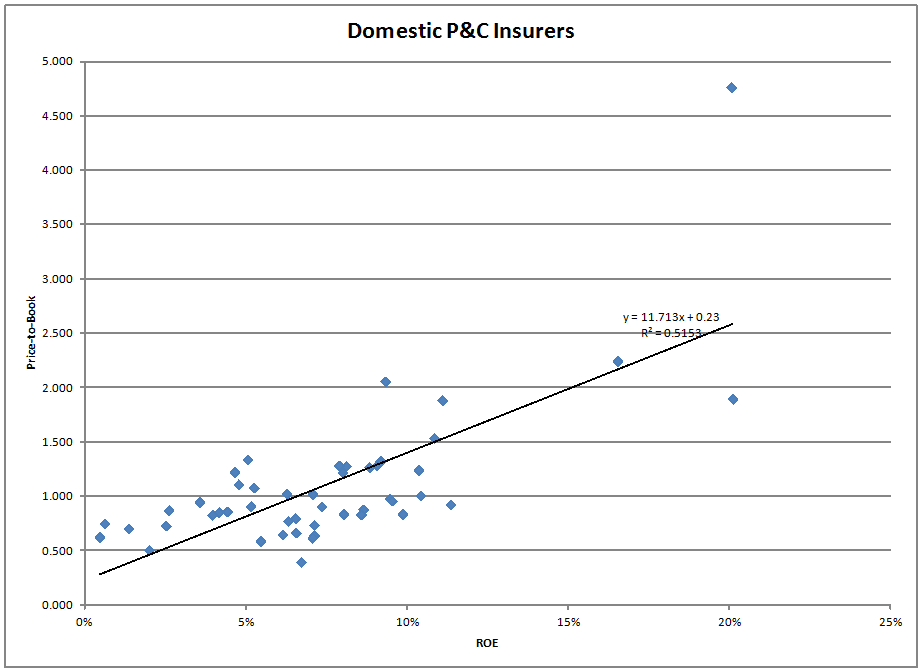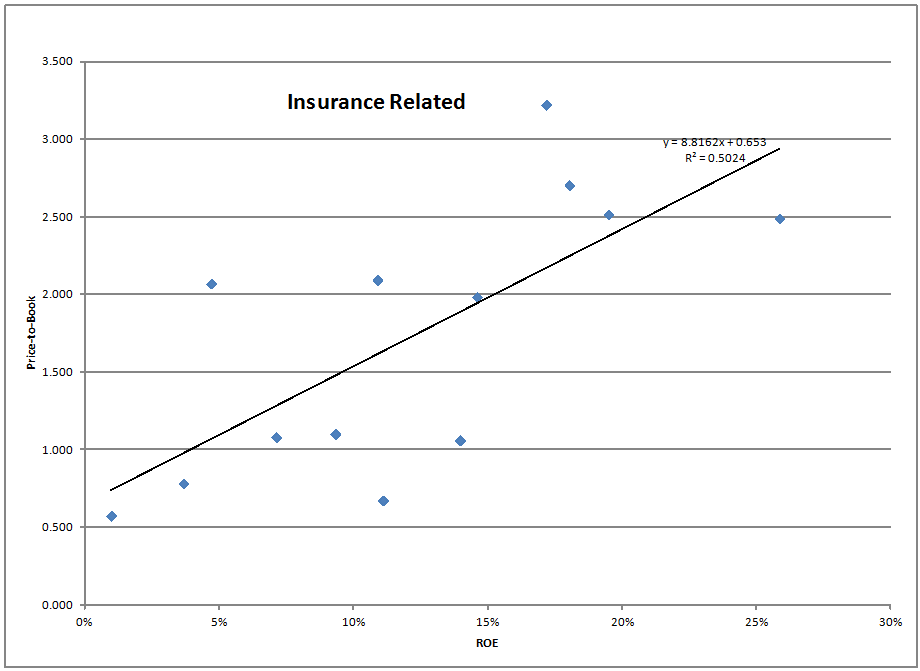On Fourth Quarter 13Fs
I often look through 13F filings to get investment ideas.? The last time I did it, one of my readers asked a question like this:
It?s nice to see how large the positions are of the investors that you track, but wouldn?t it be better to track the changes in positions?? After all, new allocations are more indicative of better value than older holdings.
That?s probably correct, though for my own investing it might not be as accurate, because I rank current positions against challengers ? my current positions have to justify their existence to stay in the portfolio.
But I thought it would be worth trying to do that, and also do it as a percentage of each stock?s market capitalization.
Now, there are difficulties in doing an analysis like this:
- CUSIP changes
- M&A (takeovers, spinoffs
- CUSIP formats (some managers make it difficult to read)
- Deliberately difficult formatting
- One firm fills out the from wrong, swapping fields
- Multiple holders within a given firm
- You have to create a CUSIP/ticker database (paid my 13-year old assistant $50 to do that.)
- In short, a lot of data scrubbing.
Now the results of looking at 13Fs can be valuable, and there is a small cottage industry doing so.? Mebane Faber has done good work with this, as has Insider Monkey, Manual of Ideas and Street of Walls.? Following the ideas of some of the best investors leads to better returns, even if there is a lag involved.
And the lag doesn?t matter much.? Most of these investors invest for years not months, so if you get a signal it should be valid for some time after it is received.
Anyway, I calculated the positions for 74 investors that I have some respect for (listed at the bottom).? My objective is to look at them as a group.? For the most part, I don?t care which of them is investing in a given company.
Following this are a variety of tables with some commentary on what might be going on.? I think you might find some valuable ideas in the companies where ?there are large additions or holdings as a proportion of market capitalization.
Tables
Stocks with the most new investors:
| New | Ticker | Name |
|
9 |
DLPH | Delphi Automotive PLC |
|
6 |
LVLT | LEVEL 3 COMMUNICATIONS INC |
|
6 |
LMCA | LIBERTY MEDIA CORP NEW |
|
5 |
ORCL | Oracle Corp |
|
4 |
TRIP | TRIPADVISOR INC |
|
4 |
KORS | MICHAEL KORS HLDGS LTD |
|
3 |
BAC | BANK OF AMERICA CORP |
|
3 |
CVX | CHEVRON CORP NEW |
|
3 |
DELL | Dell Inc |
|
3 |
EP | EL PASO CORP |
|
3 |
VRUS | PHARMASSET INC |
|
3 |
TDC | TERADATA CORP |
Stocks that had the most investors increase positions (including new owners):
| Increased | Ticker | Name |
|
15 |
GOOG | GOOGLE INC. |
|
9 |
DLPH | Delphi Automotive PLC |
|
9 |
AAPL | APPLE INC |
|
8 |
ORCL | Oracle Corp |
|
7 |
LMCA | LIBERTY MEDIA CORP NEW |
|
7 |
C | CITIGROUP INC |
|
7 |
LOW | LOWES COS INC |
|
7 |
PEP | PEPSICO INC |
|
7 |
MSFT | MICROSOFT CORP |
|
7 |
V | Visa Inc-Class A Shares |
|
6 |
LVLT | LEVEL 3 COMMUNICATIONS INC |
|
6 |
INTC | Intel Corporation |
|
6 |
SYY | SYSCO CORP |
Stocks that have the most owners at the end of the fourth quarter:
| Owned | Ticker | Name |
|
22 |
GOOG | GOOGLE INC. |
|
21 |
MSFT | MICROSOFT CORP |
|
17 |
AAPL | APPLE INC |
|
14 |
CSCO | CISCO SYS INC COM |
|
14 |
WMT | WAL-MART STORES INC |
|
14 |
WFC | WELLS FARGO & CO NEW |
|
13 |
JNJ | JOHNSON & JOHNSON |
|
12 |
ORCL | Oracle Corp |
|
12 |
C | CITIGROUP INC |
|
12 |
MA | Mastercard Inc – Class A |
|
11 |
BAC | BANK OF AMERICA CORP |
|
11 |
BRK.B | BERKSHIRE HATHAWAY INC-CL B |
|
11 |
BRK.A | BERKSHIRE HATHAWAY INC-CL A |
Stocks with the most selling out entirely (including M&A-related):
| Sold | Ticker | Name |
|
6 |
EXPE | Expedia Inc. |
|
6 |
LVLT | Level 3 Communications |
|
5 |
C | CITIGROUP INC |
|
5 |
SINA | SINA CORP |
|
5 |
Acquired | NALCO HOLDING COMPANY |
|
4 |
EBAY | EBAY INC |
|
4 |
CVI | CVR Energy Inc |
|
4 |
CCE | COCA COLA ENTERPRISES INC NE |
|
3 |
LINTA | LIBERTY INTERACTIVE CORP-A |
|
3 |
CVS | CVS CAREMARK CORPORATION |
|
3 |
AMZN | AMAZON COM INC |
|
3 |
VIAB | Viacom Inc Cl B |
|
3 |
EXC | Exelon Corp |
|
3 |
DVN | DEVON ENERGY CORPORATION |
|
3 |
COV | COVIDIEN PLC |
|
3 |
XOM | EXXON MOBIL CORP |
|
3 |
MOS | The Mosaic Company |
|
3 |
RL | RALPH LAUREN CORP |
|
3 |
IRM | IRON MTN INC |
|
3 |
HFC | HOLLYFRONTIER CORP |
|
3 |
GR | GOODRICH CORP |
|
3 |
CTXS | CITRIX SYS INC |
|
3 |
Acquired | CEPHALON INC |
|
3 |
ELNK | EARTHLINK INC |
|
3 |
TIN | TEMPLE INLAND INC |
Stocks with the most decreases in positions (including selling out in entire):
| Decreased | Ticker | Name |
|
12 |
MSFT | MICROSOFT CORP |
|
10 |
WFC | WELLS FARGO & CO NEW |
|
10 |
C | CITIGROUP INC |
|
8 |
BAC | BANK OF AMERICA CORP |
|
8 |
PFE | PFIZER INC |
|
8 |
EBAY | EBAY INC |
|
8 |
NWSA | NEWS CORP |
|
8 |
LINTA | LIBERTY INTERACTIVE CORP-A |
|
7 |
AAPL | APPLE INC |
|
7 |
CSCO | CISCO SYS INC COM |
|
7 |
WMT | WAL-MART STORES INC |
|
7 |
BRK.B | BERKSHIRE HATHAWAY INC-CL B |
|
7 |
CVS | CVS CAREMARK CORPORATION |
|
7 |
DELL | Dell Inc |
|
7 |
AON | AON CORP |
|
7 |
AMZN | AMAZON COM INC |
|
7 |
EXPE | Expedia Inc. |
With a few exceptions, the above reads like lists of common large cap stocks, with a few midcaps thrown in.? It doesn?t look that much different when the lists are done by dollar amount of change.? But what if we do this as a fraction of market capitalization?
(Please note, the 13F filings measure as of 12/31/2011, and my market caps are from mid-February.? That induces some distortion, but I don?t think that much.? Also note that large holdings as aproportion of market cap often come from one hedge fund and not necessarily many.
Here is a list of new purchases, in declining order of percentage of market capitalization:
| New | Ticker | Name |
|
16.50% |
TRGT | TARGACEPT INC |
|
15.02% |
DLPH | Delphi Automotive PLC |
|
10.73% |
CMVT | COMVERSE TECHNOLOGY INC |
|
10.54% |
NTK | NORTEK INC |
|
7.54% |
ARO | Aeropostale Inc |
|
6.41% |
MTG | MGIC INVT CORP WIS |
|
6.21% |
HII | HUNTINGTON INGALLS INDS INC |
|
5.76% |
IRE | Bank of Ireland |
|
5.64% |
TRIP | TRIPADVISOR INC |
|
5.08% |
LMCA | LIBERTY MEDIA CORP NEW |
|
4.75% |
AVY | Avery Dennison |
|
4.58% |
SEMG | SEMGROUP CORP |
|
4.41% |
VPRT | VISTAPRINT N V |
|
4.25% |
MPC | MARATHON PETROLEUM CORP |
|
3.92% |
CSTR | COINSTAR INC |
|
3.49% |
SBH | SALLY BEAUTY HLDGS INC |
|
3.44% |
KMT | Kennametal Inc. |
|
3.34% |
SIRO | Sirona Dental Systms |
|
3.18% |
EP | EL PASO CORP |
|
3.10% |
HGG | HHGREGG INC |
|
3.06% |
CVI | CVR Energy Inc |
|
3.04% |
NTAP | NETAPP INC |
Here is a list of position increases, including new purchases, in declining order of percentage of market capitalization:
| Increased | Ticker | Name |
|
16.50% |
TRGT | TARGACEPT INC |
|
15.02% |
DLPH | Delphi Automotive PLC |
|
10.77% |
CP | CANADIAN PAC RY LTD |
|
10.73% |
CMVT | COMVERSE TECHNOLOGY INC |
|
10.54% |
NTK | NORTEK INC |
|
8.55% |
WBMD | WEBMD HEALTH CORP |
|
7.54% |
ARO | Aeropostale Inc |
|
6.57% |
NAV | Navistar International Corp |
|
6.41% |
MTG | MGIC INVT CORP WIS |
|
6.21% |
HII | HUNTINGTON INGALLS INDS INC |
|
5.76% |
IRE | Bank of Ireland |
|
5.74% |
AVY | Avery Dennison |
|
5.64% |
TRIP | TRIPADVISOR INC |
|
5.19% |
LMCA | LIBERTY MEDIA CORP NEW |
|
4.58% |
SEMG | SEMGROUP CORP |
|
4.48% |
EPAX | Ambassadors Group Inc. |
|
4.44% |
CBG | CBRE GROUP INC |
|
4.42% |
CSTR | COINSTAR INC |
|
4.41% |
VPRT | VISTAPRINT N V |
|
4.25% |
MPC | MARATHON PETROLEUM CORP |
|
4.08% |
PCLN | PRICELINE COM INC |
Here is a list of position decreases, including total sales, in declining order of percentage of market capitalization:
| Decreased | Ticker | Name |
|
-17.83% |
VGR | VECTOR GROUP LTD |
|
-13.66% |
EMMS | EMMIS COMMUNICATIONS CORP |
|
-10.43% |
DIOD | DIODES INC |
|
-9.12% |
CLX | Clorox Co |
|
-9.02% |
NEWP | NEWPORT CORP |
|
-8.93% |
IWM | ISHARES TR |
|
-8.61% |
EXPE | Expedia Inc. |
|
-6.86% |
GEN | GENON ENERGY INC |
|
-6.60% |
PANL | UNIVERSAL DISPLAY CORP |
|
-6.43% |
LVLT | GLOBAL CROSSING LTD |
|
-6.32% |
AAMRQ | AMR Corp |
|
-6.22% |
NIHD | NII HLDGS INC |
|
-6.15% |
CVI | CVR Energy Inc |
|
-6.03% |
AMED | AMEDISYS INC |
|
-5.85% |
CIS | CAMELOT INFORMATION |
|
-5.60% |
SINA | SINA CORP |
|
-5.46% |
CQB | CHIQUITA BRANDS INTL INC |
|
-5.44% |
STE | STERIS CORP |
|
-5.37% |
CJES | C&J ENERGY SERVICES INC |
|
-5.30% |
PDLI | PDL BIOPHARMA INC |
Here is a list of positions sold out in entire, in declining order of percentage of market capitalization:
| Sold | Ticker | Name |
|
-17.83% |
VGR | VECTOR GROUP LTD |
|
-13.66% |
EMMS | EMMIS COMMUNICATIONS CORP |
|
-10.43% |
DIOD | DIODES INC |
|
-9.08% |
CLX | Clorox Co |
|
-9.02% |
NEWP | NEWPORT CORP |
|
-7.41% |
EXPE | Expedia Inc. |
|
-6.60% |
PANL | UNIVERSAL DISPLAY CORP |
|
-6.56% |
IWM | ISHARES TR |
|
-6.43% |
LVLT | GLOBAL CROSSING LTD |
|
-6.32% |
AAMRQ | AMR Corp |
|
-6.22% |
NIHD | NII HLDGS INC |
|
-6.03% |
AMED | AMEDISYS INC |
|
-5.85% |
CIS | CAMELOT INFORMATION |
|
-5.60% |
SINA | SINA CORP |
|
-5.27% |
CQB | CHIQUITA BRANDS INTL INC |
|
-5.10% |
CVI | CVR Energy Inc |
|
-4.97% |
IT | GARTNER INC |
|
-4.90% |
ACFC | Atlantic Coast Financial Corp |
|
-4.73% |
BIDZ | BIDZ.com Inc. |
|
-4.55% |
CVC | CABLEVISION SYS CORP |
|
-4.52% |
SAFM | SANDERSON FARMS INC |
|
-4.32% |
LEA | LEAR CORP |
|
-4.31% |
TIN | TEMPLE INLAND INC |
|
-4.05% |
WGO | WINNEBAGO INDS INC |
Holdings by Total Dollar Amount at the end of the Fourth Quarter
| Held | Ticker | Name |
| ? 15,763,863,000 | KO | COCA COLA COMPANY |
| ? 13,896,920,000 | WFC | WELLS FARGO & CO NEW |
| ? 11,801,570,000 | IBM | INTERNATIONAL BUSINESS MACHS |
| ???? 7,498,749,000 | AXP | AMERICAN EXPRESS CO |
| ???? 7,124,564,000 | PG | PROCTER & GAMBLE CO/THE |
| ???? 5,561,149,000 | WMT | WAL-MART STORES INC |
| ???? 4,965,749,000 | KFT | KRAFT FOODS INC-CLASS A |
| ???? 4,828,136,000 | MSFT | MICROSOFT CORP |
| ???? 4,720,375,000 | GOOG | GOOGLE INC. |
| ???? 4,539,055,000 | NWSA | NEWS CORP |
| ???? 4,504,224,000 | AAPL | APPLE INC |
| ???? 4,007,205,000 | HPQ | HEWLETT PACKARD CO |
| ???? 3,387,821,000 | MSI | MOTOROLA SOLUTIONS INC |
| ???? 3,285,855,000 | GLD | SPDR GOLD TRUST |
| ???? 3,261,413,000 | GSK | GLAXOSMITHKLINE PLC-SPON ADR |
| ???? 3,137,451,000 | JNJ | JOHNSON & JOHNSON |
| ???? 3,106,083,000 | USB | US BANCORP DEL |
| ???? 3,089,445,000 | FDX | FEDEX CORP |
| ???? 2,986,973,000 | COF | CAPITAL ONE FINANCIAL CORP |
| ???? 2,869,898,000 | EP | EL PASO CORP |
| ???? 2,836,729,000 | IEP | ICAHN ENTERPRISES LP |
| ???? 2,809,578,000 | SLB | Schlumberger Ltd |
| ???? 2,807,657,000 | NVS | NOVARTIS AG-ADR |
| ???? 2,776,985,000 | BK | BANK OF NEW YORK MELLON CORP |
| ???? 2,762,244,000 | COP | CONOCOPHILLIPS |
| ???? 2,704,595,000 | PEP | PEPSICO INC |
| ???? 2,620,576,000 | CMCSA | COMCAST CORP-CLASS A |
| ???? 2,618,651,000 | PFE | PFIZER INC |
| ???? 2,524,873,000 | DELL | Dell Inc |
| ???? 2,475,713,000 | GE | GENERAL ELECTRIC CO |
| ???? 2,321,383,000 | OXY | OCCIDENTAL PETE CORP DEL |
| ???? 2,314,288,000 | TWX | TIME WARNER INC |
| ???? 2,290,333,000 | MRK | MERCK & CO. INC. |
| ???? 2,252,588,000 | AON | AON CORP |
| ???? 2,246,712,000 | DTV | DIRECTV-CLASS A |
| ???? 2,205,486,000 | PCLN | PRICELINE COM INC |
| ???? 2,166,225,000 | MMI | MOTOROLA MOBILITY HLDGS INC |
| ???? 2,124,678,000 | SNY | SANOFI-ADR |
| ???? 2,075,367,000 | QCOM | QUALCOMM INC |
And the greatest holdings by percentage of market capitalization:
| Held/MC | Ticker | Name |
|
73.30% |
IEP | ICAHN ENTERPRISES LP |
|
71.98% |
BAGL | EINSTEIN NOAH REST GROUP INC |
|
69.22% |
HRG | HARBINGER GROUP INC |
|
65.92% |
FDML | FEDERAL MOGUL CORP |
|
51.38% |
SPB | SPECTRUM BRANDS HLDGS INC |
|
46.89% |
ARII | AMERICAN RAILCAR INDS INC |
|
40.88% |
CDCO | Comdisco Holding |
|
38.77% |
NOA | NORTH AMERN ENERGY PARTNERS |
|
37.92% |
DYN | DYNEGY INC DEL |
|
36.46% |
BFLY | BLUEFLY INC |
|
32.11% |
LEAP | LEAP WIRELESS INTL INC |
|
29.37% |
QUAD | QUAD / GRAPHICS INC |
|
29.34% |
TXI | Texas Industries Inc. |
|
28.92% |
BIOF | BIOFUEL ENERGY CORP |
|
27.83% |
ENZN | ENZON PHARMACEUTICALS INC |
|
27.56% |
HPP | HUDSON PAC PPTYS INC |
|
27.54% |
BKU | BANKUNITED INC |
|
27.54% |
OSTK | OVERSTOCK COM INC DEL |
|
27.35% |
SIX | SIX FLAGS ENTMT CORP NEW |
|
26.41% |
DIN | DINEEQUITY INC |
|
26.27% |
WPO | Washington Post |
|
26.04% |
LORL | LORAL SPACE & COMMUNICATNS INC |
|
25.12% |
LGF | LIONS GATE ENTMNT CORP |
|
25.00% |
VSAT | VIASAT INC |
|
24.85% |
JEF | JEFFERIES GROUP INC NEW |
|
24.71% |
INS | INTELLIGENT SYS CORP NEW |
|
24.59% |
LVLT | LEVEL 3 COMMUNICATIONS INC |
|
24.21% |
ZLC | ZALE CORP NEW |
|
23.40% |
ABH | ABITIBIBOWATER INC |
|
23.19% |
CTO | Consolidated Tomoka Land Co |
|
22.71% |
XCO | EXCO RESOURCES |
|
22.34% |
THRX | THERAVANCE INC |
|
22.28% |
MLI | MUELLER INDS INC |
|
21.96% |
MSI | MOTOROLA SOLUTIONS INC |
|
21.49% |
SNBC | Sun Bancorp Inc |
I appreciate the analysis as a portion of market capitalization, because it reflects the limitations of what managers can do.? Again, I will look most closely at current holdings and additions as a proportion of market capitalization.
Investor list:
- Akre
- Altai
- Ancient Art
- Appaloosa
- Atlantic
- Bares
- Baupost
- Blue Ridge
- BP Capital (Pickens)
- Brave Warrior
- Breeden
- BRK
- Capital Growth
- Centaur
- Centerbridge
- Chou
- Coatue
- Dodge & Cox
- Dreman
- Eagle Capital
- Eagle Value
- Edinburgh
- Fairfax
- Farallon
- Fiduciary
- Force
- FPA
- Gates
- Glenview
- GoldenTree
- Greenhaven
- Greenlight
- H Partners
- Harbinger
- Hawkshaw
- Hayman
- Hound
- Hovde
- Icahn
- Invesco Private
- Jana
- Jensen
- Joho
- Lane Five
- Leucadia
- Lone Pine
- M3F
- Markel
- Matrix
- Maverick
- MHR
- Montag
- MSD
- Muhlenkamp
- PabraI
- Parnassus
- Passport
- Paulson
- Pennant
- Perry
- Pershing Square
- Sageview
- Scout
- Soros
- Southeastern
- Third Point
- Tiger Global
- Tweedy Browne
- ValueAct
- Viking
- Weitz
- West Coast
- Wintergreen
- Yacktman
Full disclosure: Long WMT, ORCL, INTC, VOD, HPQ, COP, Short SPY








